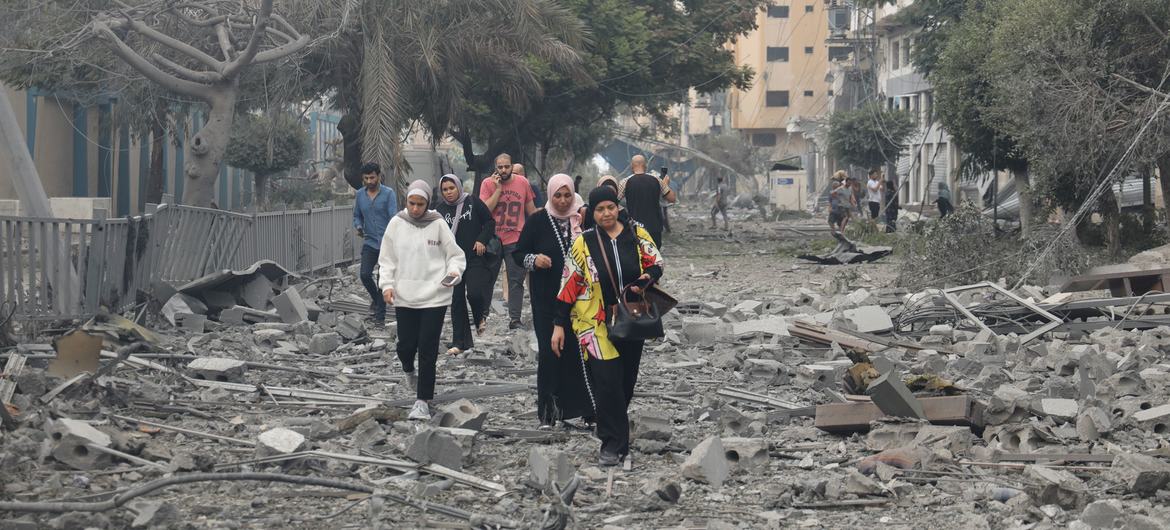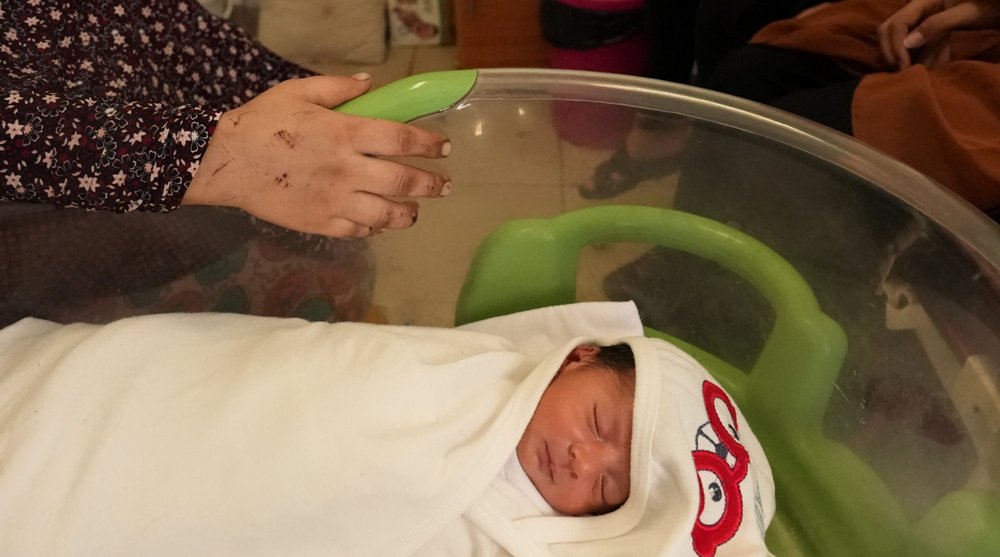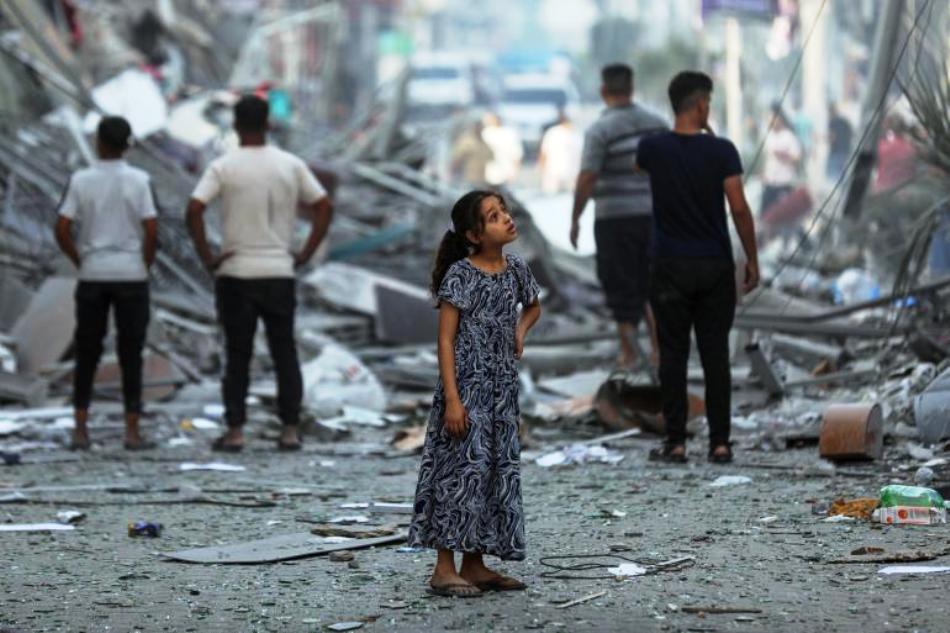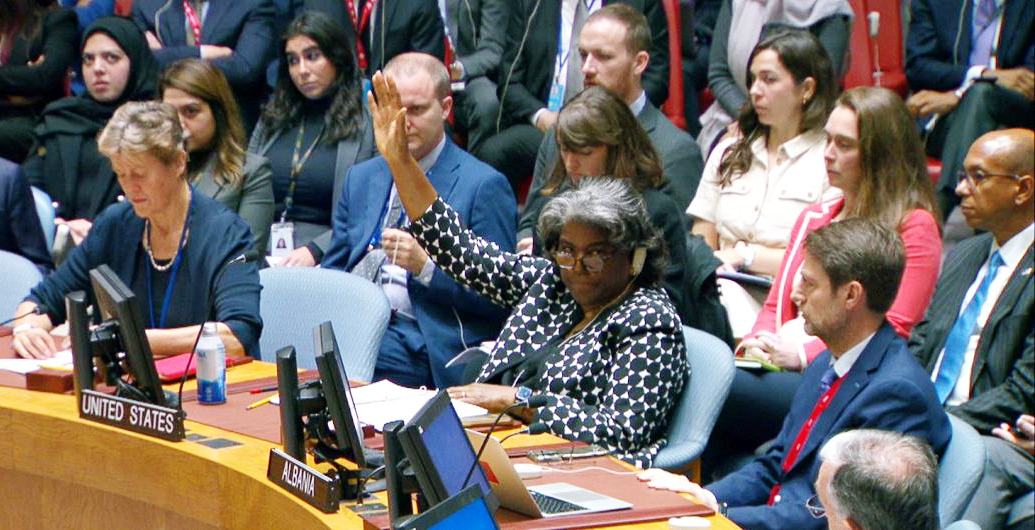by Umaima Reshi
In Gaza, women face the daunting challenge of obtaining menstrual hygiene products, resorting to makeshift solutions like tearing children’s clothing. Some turn to pills to delay periods, risking side effects like nausea. The absence of water and privacy makes menstruation a persistent source of stress. In extreme cases, women resort to perilous alternatives, like using diapers designed for their young children.

Amidst escalating health challenges and sanitation issues in Gaza, women grapple with maintaining hygiene amidst conflict. Despite adversities, they persevere, making compromises with minimal necessities, determined to uphold their intrinsic dispositions.
According to the Palestinian Central Bureau of Statistics, Gaza’s current population stands at 5.48 million, with 2.78 million males and 2.70 million females. Shockingly, one in four individuals is a woman or girl of reproductive age. An alarming estimate predicts around 50,000 births, resulting in 150-180 deliveries daily. Unfortunately, overwhelmed hospitals, are worsened by conflict and a shortage of vital resources, leaving many without access to safe delivery services.
The conflict’s impact is worsened as 80 per cent of Gaza’s population is displaced. This particularly affects women and girls, constantly on the move or seeking refuge in crowded shelters, making their living conditions increasingly challenging.
Given these circumstances, urgent attention is needed to address women’s specific needs in Gaza, ensuring access to essential resources and services, especially during childbirth. The international community must unite to provide crucial support, alleviating the plight of these women as they navigate these trying times with dignity and resilience.
Over fifty per cent of Gaza’s population seeks refuge in UNRWA facilities, facing distressing conditions marked by insufficient water and food. This dire situation leads to hunger, malnutrition, dehydration, and the spread of waterborne diseases.
“The escalation of hostilities in the Palestinian territory is disproportionately affecting women, children, and newborns, both as casualties and by limiting access to health services.” This cautionary statement was jointly issued by the United Nations Children’s Fund (UNICEF), the United Nations Relief and Works Agency for Palestine Refugees in the Near East (UNRWA), the United Nations sexual and reproductive health agency (UNFPA), and the World Health Organization (WHO).
As of December 22, 2023, Ministry of Health data reports that 6,200 women and 8,000 children have lost their lives in Gaza, with thousands more injured. UN Women figures show 951,490 displaced women and girls, including 2,784 widows and 10,022 who lost their fathers.

Childbearing Complexity
Ongoing bombardments, health facility inoperability, extensive displacement, and scarce resources significantly disrupt maternal, newborn, and child health services. In these conditions, women struggle to access crucial emergency obstetric services, essential for safe childbirth and newborn care.
The closure of 14 hospitals and 45 primary health care centres pushes some to give birth in makeshift shelters, residences, or debris-laden public areas. Others deliver in overwhelmed facilities with deteriorating sanitary conditions, escalating infection, and complication risks. Meanwhile, health facilities increasingly become targets of attacks.
The anticipated surge in maternal mortality is tied to insufficient healthcare access. Ongoing hostilities amplify psychological stress, leading to trauma-induced miscarriages, stillbirths, and premature births, some fatal.
Even before the escalation, malnutrition rates were high among expectant mothers, impacting infant survival. As food and water scarcity worsens, mothers struggle to provide, heightening risks of malnutrition, disease, and mortality.
Newborns’ lives hang in the balance. Fuel shortages jeopardize premature babies relying on neonatal care, as vital medical equipment ceases to operate.

Amal, 7, contemplating her neighbourhood after neighbouring homes were levelled to the ground.
Recently The Washington Post reported from Jerusalem that Salma Tarabin, eight months pregnant, expresses her hope for the cessation of the war before the arrival of her third child into what she perceives as a “poisoned” environment.
The 30-year-old woman conveys her exhaustion, hunger, and illness from consuming contaminated water. Describing her living conditions, she details a month-long experience of sleeping on a hard classroom floor, sharing the space with over 80 women and children, while men and older boys sleep outdoors in the courtyard of a former UNRWA-operated school in Rafah, southern Gaza.
Having undergone Caesarean sections for her first two children, Tarabin now dreads the prospect of undergoing a third in these adverse conditions. She expresses concerns about the availability of scarce anaesthesia and her uncertainty about the upcoming month. In her own words, she expresses, “I am afraid I will die before the baby is born.”
Primary evaluations conducted by UNRWA indicate that 4,600 pregnant women and approximately 380 newborns, both displaced and residing in these facilities, need medical attention. The situation is further complicated by the alarming occurrence of more than 22,500 cases of acute respiratory infections and 12,000 cases of diarrhoea.
Gaza is currently grappling with a colossal humanitarian crisis. According to the World Food Programme, typically four out of five Gazans are already struggling with hunger, and the looming threat of famine adds to the distressing scenario
Menstrual cycles as an obstacle
“UNRWA disperses sanitary pads at the school, although the quantity is far from sufficient,” asserts a woman to The Washington Post.
Faced with this shortage, she resorts to cutting up soiled clothes for her daughters. Lacking access to water and privacy, they are unable to maintain personal hygiene or clean their undergarments.
Close by, Nahid Abdel Hamid, a 26-year-old mother of three, employs birth control measures to prevent menstruation. While acknowledging potential adverse effects, she expresses gratitude, recognizing this choice as a “safe space” to shield herself from the prevailing lack of hygiene.

In Gaza, women face a severe health crisis worsened by Israel’s blockade, limiting access to vital reproductive supplies and fundamental necessities like water and food. Mothers express their distress, lacking means to protect themselves and their children from targeted bombardment on residential areas, hospitals, and schools.
In the face of persistent challenges in securing access, UN agencies have dispatched critical medications and equipment to Gaza to cover provisions for newborns and reproductive healthcare. However, there exists a crucial need for a more substantial response to address the fundamental requirements of the civilian population, particularly pregnant women, children, and newborns. Notably, no fuel has entered the Gaza Strip since October 7, emphasising the immediate necessity for aid agencies to receive fuel to sustain their support, especially to hospitals.
The United Nations Population Fund (UNFPA) is actively engaged in ensuring the delivery of crucial reproductive health resources to Gaza. To date, the organisation has dispatched five truckloads of reproductive health kits, comprising pharmaceuticals, equipment, and supplies essential for emergency obstetric and neonatal care, including anaesthetics for Caesarean sections. Additionally, UNFPA is distributing clean delivery kits to improve hygienic conditions for childbirth, regardless of the location, and providing kits tailored for women who have recently given birth.
An urgent humanitarian halt is imperative to alleviate prevailing suffering and prevent the escalation of an already dire situation into a catastrophic one.
(The author is a student and intern at Kashmir Life. Ideas are personal.)















